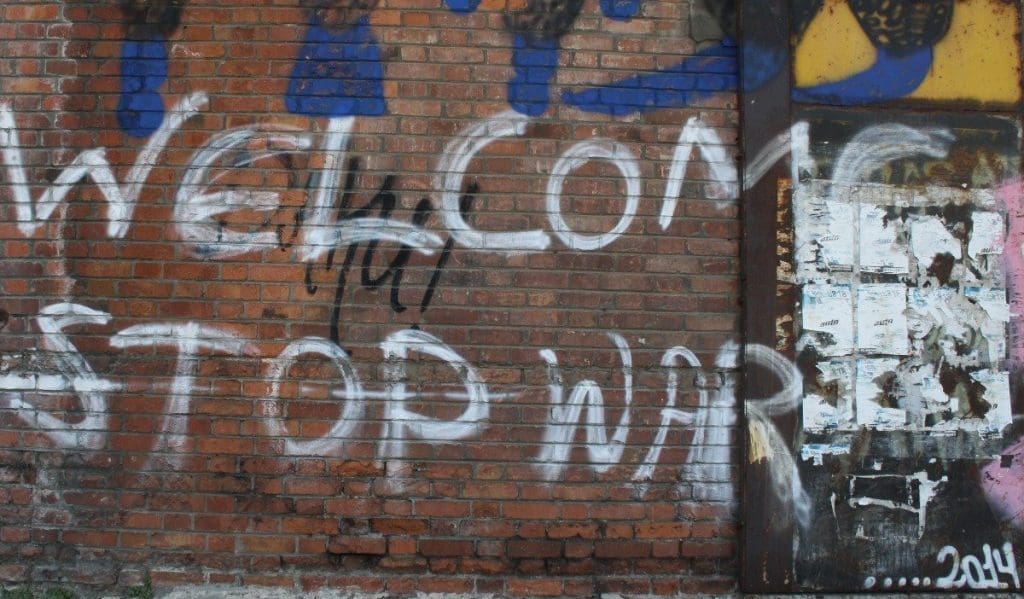AntiNote: The following is an extended excerpt of a radio interview, edited for readability. Listen to it in its entirety:
On 24 April 2015, Chuck Mertz of This is Hell! Radio (Chicago) talked to author and educator Andrew Hartman about the ambiguous legacies of the concurrent but dissonant cultural and economic revolutions of the last fifty years in the US.
This has been a topic of reliable contention in the AWC: how much a focus on cultural struggle may distract from or even impede the ostensibly more pertinent material struggle against neoliberalism—or, put the other way, whether a purely material, structural economic struggle is worthwhile or even possible without a cultural dimension.
When it comes to specific issues and strategies, implicit disagreements about how to answer these questions divide many on the Left. We appreciate Hartman’s approving attention to cultural struggle and its successes, as well as his sober awareness of perhaps greater defeats in the political-economic sphere, and join him in encouraging us all to consider both together when organizing our struggles today.
“As more and more people have clawed their way into whatever this thing is that we call American identity, fewer and fewer people have been willing to commit to the collective good. That’s the paradox.”
Chuck Mertz: Remember the Culture Wars? You don’t? Well, it turns out they were a lot more important than we thought they were. The shock and awe of the Culture Wars ended years ago, but the bombshells it dropped reverberate across time. Here to take us all back: Andrew Hartman, author of A War for the Soul of America: A History of the Culture Wars.
Andrew is associate professor of history at Illinois State University and also the author of Education and the Cold War: The Battle for the American School. Good morning, Andrew.
Andrew Hartman: Good morning, Chuck, thank you for having me on.
CM: So, I didn’t even know that the Culture Wars were over. I keep seeing the exact same arguments we saw in the late eighties and early nineties. Many of the same issues still linger in political campaigns today, with people trying to find what kind of America they identify with when they go to the polls.
So why do you think the Culture Wars are over, when so many of their battles are still being fought?
AH: I admit that of all the arguments I make in the book, I’m on the thinnest ice with that one. But I think that the major fault lines of the Culture Wars of the 1980s and 90s, especially on issues such as feminism and gay rights and what type of humanities education should be taught in the nation’s universities—those were some of the major battles of the eighties and nineties—for the most part, the logic of those culture wars no longer make sense. I think that the Left, the cultural Left, has won.
That said, I think that the victory is paradoxical, and contemporary debates are fought on much different terrain because of the victories of neoliberalism.
CM: So when it comes to feminism, when it comes to gay rights, when it comes to the way that the humanities are taught—it would seem the Left won those battles. But you also point out in your book that every one of those things seems to have been sidetracked.
Feminism is no longer about equality overall, it’s about the kind of thing Cheryl Sandberg from Facebook talks about: improving your career and getting to the corner office. And gay rights got sidetracked into this conversation about marriage, which is—as you point out in your book—a very conservative idea. And when it comes to the humanities, that’s been sidetracked by the Right just circumventing the public school system in general.
How much did the Left really win in the Culture Wars?
AH: That’s the conundrum, right? My larger argument is that the Culture Wars in the eighties and nineties were fought over the legacy of the sixties, and especially the New Left movements of the sixties—which, although they were never politically successful, changed the national culture tremendously. Irrevocably. The nation is much more pluralistic. It’s less sadist. It’s much more feminist, even though I think there are limitations there.
But all of this is playing out in a context of neoliberal revolution as well. So that’s why when I say “the Left” I mean the cultural Left; these victories are extremely limited.
When I analyze this paradoxical history, I like to focus on higher education, because that’s the world I live in. There’s no doubt that the Left won these humanities debates of the eighties and nineties. The type of history taught in most American universities, the type of literature that’s assigned, is from a cultural Left perspective.
But this is in the context of a shrinking emphasis on the humanities overall. The humanities are considered by many to be a luxury good. When I look back to the debates about the Canon in the humanities during the eighties and nineties, I’m sort of nostalgic for it. Because at least at that point we had a right wing led by people like Secretary of Education William Bennett, who believed that all Americans should learn the humanities—they just had a very different vision of the humanities.
But now it’s perceived as a luxury good. We have politicians in places like Florida suggesting that if you’re going to major in the humanities you should pay more for tuition, because it’s a luxury good and it doesn’t have an immediate, utilitarian economic application.
CM: So did all of the Right’s worst fears end up coming true? Were they right when they said all these horrible things are going to happen to American culture? Did they end up being right?
AH: That’s an interesting question. The conservative view of the 1960s was right to some degree. Things did change dramatically, in ways that they were unhappy about. Whether these were “horrible” things depends, I guess, on how you view these things.
One of the Right’s narratives—especially on the Christian Right—about the trajectory of American history is the decline of a Christian nation. They point back to things like the 1962 Supreme Court case Engel v. Vitale, in which the Supreme Court ruled that prayer in school was a violation of the first amendment.
This was a product of the ongoing secularization of the public sphere. They point to that, and they say that prior to 1962, American society or culture was good and wholesome; it was cohesive. Look at everything that’s happened since then! Middle-class white students protesting, the black power movement, feminism, gay rights, increased crime in the cities, etcetera. They think that a nation that is not based on bedrock higher principles rooted in the Bible is a nation that is damned. And they have a weird sort of evidence that, if you take it with a grain of salt, makes sense because the nation has changed dramatically.
But those of us on the Left, I think, should recognize that the nation has changed for the better while still also recognizing that conservatives are winning the war of economics.
CM: Do you think one of the legacies of the Culture Wars is that we so often hear people say, “I’m socially liberal but economically conservative?”
AH: There’s little doubt about that, and that’s why this victory is paradoxical. In the sixties, I think that the overarching victory was basically about individual rights. This libertarian sensibility has won out, and its conception of individual rights extends into cultural rights in ways that I think most of us probably support. But while there are some good things about it, compared to pre-sixties America, there are some bad things about it as well.
I like to think about it in terms of commitment to the collective good. It was much easier, I suppose, for many white middle-class Americans to be committed to the collective good (signified, perhaps, by their willingness to pay higher taxes) when the “collective good” as they imagined it was a narrow, white, Christian America. But as more and more people clawed their way into whatever this thing is that we call American identity, fewer and fewer people have been willing to commit to the collective good. That’s the paradox.
“In the eighties and nineties, when it came to issues like gay rights and education, conservatives were concerned with recapturing the national trajectory on these issues. Now, having lost that debate, they seem much more interested in creating their own autonomous conservative zones where they can define cultural parameters.”
CM: You write, “In the post-war years, the nearly two decades between the end of World War II and the assassination of John F. Kennedy, a cluster of powerful conservative norms set the parameters of American culture. These cultural standards are best described by the phrase normative America, an analytical category I use to refer to an inchoate group of assumptions and aspirations shared by millions of Americans during the post-war years.
“Normative Americans prized hard work, personal responsibility, individual merit, delayed gratification, social mobility, and other values that middle class whites recognized as their own. Normative Americans lived according to stringent sexual expectations; sex, whether for procreation or recreation, was contained within the parameters of heterosexual marriage. Normative Americans behaved in ways consistent with strict gender roles within the confines of marriage. Men worked outside the home and women cared for children inside it.
“Normative Americans believed their nation was the best in human history. Those aspects of American history that shined an unfavorable light on the nation, such as slavery, were ignored or explained away as aberrations. Normative Americans often assumed that the nation’s Christian heritage illuminated its unique character. The United States of America really was a city on the hill.”
And you add that the normative America of the 1950s was “more omnipresent and more coercive than it had been before or has been since.”
First of all, why was normative America so successful? And how was it coercive?
AH: Great question. I would argue that there had already been tremors of cultural change—inherent to modernity, or to the politics and culture of capitalism—bubbling to the surface of American culture and society for a long time prior to World War II. But they hadn’t fully blown through, and because of the great mid-century crises of the Depression and the War, there was a pushback against these cultural revolutions, because there was a need to commit to a national purpose.
But after the war, there was this sense that without this great crisis and the “purpose” it brought with it, things might start to change dramatically. So there was an implicit attempt to police cultural boundaries.
Wrap in the Cold War—when there’s this foreign enemy, which also could be an internal enemy, with an alien ideological conception about how to define human existence—and it becomes an existential battle. Then the need to police cultural norms became much more intense than before or since. McCarthyism is the extreme example of that, but it was much more pervasive, even, than that.
Normative America was partly a product of having an alien entity to think of as something that needs to be resisted, both in terms of military force and also (perhaps more importantly) in terms of ideology and the way we behave and define our society.
CM: I think that one of the things that people on the Left would say is that normative America was a myth. It never actually existed in reality. How much do you think people downplay the idea that normative America was a real thing and not just an illusion? And if it were an illusion, does that make any difference anyway?
AH: I agree it’s a myth. It was all myths about what it means to be an American and what it means to be a “proper” human. But these are very powerful myths. And they were more powerful, I would argue, in the era between World War II and the early 1960s than at any other time.
The “traditional” nuclear family that conservatives looked back to as this ideal thing—it was never more traditional in that sense than during the 1950s. Before that, the family was not as cohesive as conservatives like to imagine.
This was a very particular moment in American history, that I argue the sixties blew open. And it’s based upon myths, but these were powerful myths that people believed in—and not just people who fit the stereotypical image of a normative American. These were myths that were pervasive for others as well.
CM: Still, normative America did in fact exist for many. For them, the other, fractured America was unimaginable. Meanwhile, in fractured America…were people not living in white-dominated normative America aware of normative America? Are the Culture Wars due to one side turning a blind eye to the other until that was no longer possible?
“As much as I admire the cultural revolutions of the 1960s, the forces of capitalism can easily adapt to that. In fact, they have adapted to it better than any one person in America has.”
AH: For many Americans—those who rose up in rejecting normative America in the sixties, for example—there was never an America that they could be a part of. It was always fractured. There wasn’t an American culture they could call their own.
So they challenged that. They wanted to be included in the collective political and cultural project of the nation. And in their eyes, the nation became more whole after the 1960s. If you were black and living in the Jim Crow south, for example, this normative America was your enemy. If you were one of Betty Friedan’s housewives who was addicted to meds because you were so depressed about your situation, then I think implicitly this normative America was not for you.
More and more people began to realize this is not “our” nation, so we’re going to create a new one. And people who identified with the former nation were pretty pissed about that.
CM: You mentioned individual rights before. You also write about the anti-authoritarian individualism that seems to have swept up a lot of American culture. How much is this anti-authoritarian individualistic American the new normative American?
AH: That’s a really good point. This is how the Culture Wars were different, and why I think of them as separate, over. In the eighties and nineties, when it came to issues like gay rights and education, conservatives were concerned with recapturing the national trajectory on these issues. Now, having lost that debate, they seem much more interested in creating their own autonomous conservative zones where they can define cultural parameters without interference from what they would deem a secular federal government or a secular culture that wants to change their ways of living.
That’s why they’re having more success, perhaps, at the state level. Indiana creates a religious freedom law that allows for discrimination against homosexuals—they say, “Well, we can’t win the national battle, but we can still win in a state like Indiana.” That proved not to be true, because the national culture rejected it, but I think that’s what we’re seeing.
We also see this with Christian conservatives opting out of public education instead of trying to win over the curriculum—though they’ve had success in some states like Texas, of course. They’re founding Christian day schools. They’re homeschooling their children. Now there’s a much more libertarian sensibility about the Christian right.
CM: So were the real winners of the Culture Wars not the Left but the neoliberalism of privatization and the neo-conservatism of military solutions? Aren’t the economic and foreign policies that we have today farther right than what we had before the Culture Wars?
AH: It’s that paradox again: I still think we need to remember that at a cultural level, people’s attitudes are much better towards issues of race, gender, sexuality, etcetera, and we still have to think of that as a victory. But all of this happens against the backdrop of neoliberalism, and there’s no doubt that neoliberalism is the true winner of the last thirty years.
The question that many historians and political theorists have to look at is whether these two historical trajectories—the victories by the cultural left and the larger political-economic victory of neoliberalism—are separate streams, or whether they are wrapped up in one another.
CM: One more question for you, Andrew, and it’s our Question from Hell: the question we hate to ask, you might hate to answer, or our audience will hate your response. You write, “Capitalism sopped up sixties liberation, and in the process helped dig the grave of normative America. The next American movement for liberation and those who resist it will have to reckon with this historical irony.”
Does capitalism, then, create and need cultural revolution more than it needs social democracy as its fuel?
AH: Yes. I would say that’s my pessimistic conclusion. As much as I admire the cultural revolutions of the 1960s, the forces of capitalism can easily adapt to that. In fact, they have adapted to it better than any one person in America has. The forces of neoliberal capitalism are multicultural, and have some stripped-down feminist values (as we’ve seen in Cheryl Sandberg’s Lean In argument). This ongoing cultural revolution, that the American capitalist economy seems adept at adjusting to, even seems inherent to American history.
A nation like Denmark, where I spent a year living recently, has this beautiful social democracy (which is under attack right now, as are all social democracies). It’s a social democracy that works really well. But this is the tough question: it’s a small, relatively homogeneous country that has a cultural stability that the United States has never had. To what degree are these two things tied up in one another?
The closest we came to creating a social democracy in United States history was from the New Deal years on through the late 1960s with the Great Society. And that was also the most cohesive era in American history, perhaps ever. There was very little immigration during those years; the nation was focused on warfare. Is it impossible to have a social democracy without this cultural “cohesion?” I’d like to think not, in my more optimistic moments. But in my more pessimistic moments I don’t have that much hope.
CM: Andrew, I really appreciate you being on our show this morning. Enjoy the rest of your day in Bloomington and Normal, sir.
AH: Thank you very much for having me, Chuck, it was a pleasure.
Featured Image: The Struggle for Justice and Cultural Evolution (2012), Everett Spruill





